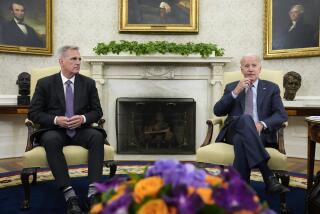Washington Peace Plan
- Share via
Common sense, which has frequently been missing in the confrontational atmosphere between the White House and Congress, has finally prevailed in the long struggle over several key arms-control issues.
The compromise deal, which was negotiated by senior Administration officials and members of a House-Senate conference committee on the defense budget, is only a temporary fix. The same issues may have to be fought out again next year. But the agreement preserves President Reagan’s flexibility in dealing with Soviet leader Mikhail S. Gorbachev at next month’s summit without requiring key members of Congress to abandon their own arms-control goals.
A near-crisis had arisen over the diametrically opposed views of the President and influential Democrats on several important arms-control issues.
The President, anxious to move forward with his Strategic Defense Initiative or SDI program while he is still in office, has favored a broad reading of the 1972 Anti-Ballistic Missile (ABM) treaty, which imposed restraints on development and deployment of missile defense systems. At the urging of Sen. Sam Nunn (D-Ga.) and other important members of the Armed Services Committees, both houses of Congress approved amendments aimed at preventing the Administration from carrying out tests that might violate the traditional, more narrow interpretation of the ABM treaty’s restraints. The White House threatened a veto if this language remained in the defense bill.
Reagan has deployed long-range nuclear arms in violation of ceilings set in the 1979 SALT II agreement, which was never ratified by the Senate. Congress, properly worried that scrapping the agreement could actually work to Moscow’s advantage, sought to force the President to abide by its provisions.
Influential lawmakers also wanted to force abandonment of Administration plans for testing of nuclear weapons and anti-satellite systems.
The compromise agreement does not specifically mention either the ABM treaty or the SALT II agreement. But in effect it forbids any SDI tests in fiscal 1988 that would violate the narrow interpretation of the ABM treaty and requires the scrapping of an older missile-firing submarine in order to keep the United States close to compliance with SALT II. The Administration agreed to observe a continued moratorium on anti-satellite tests, and Congress agreed to drop for now its demand for a ban on testing of any but the smallest nuclear weapons.
The two sides may have done nothing more than postpone the confrontation for another year. But there is hope that the spirit of compromise displayed by the White House, which was represented by Defense Secretary-designate Frank C. Carlucci, is a harbinger of better working relationships on defense issues between Congress and the President.
More to Read
Sign up for Essential California
The most important California stories and recommendations in your inbox every morning.
You may occasionally receive promotional content from the Los Angeles Times.













